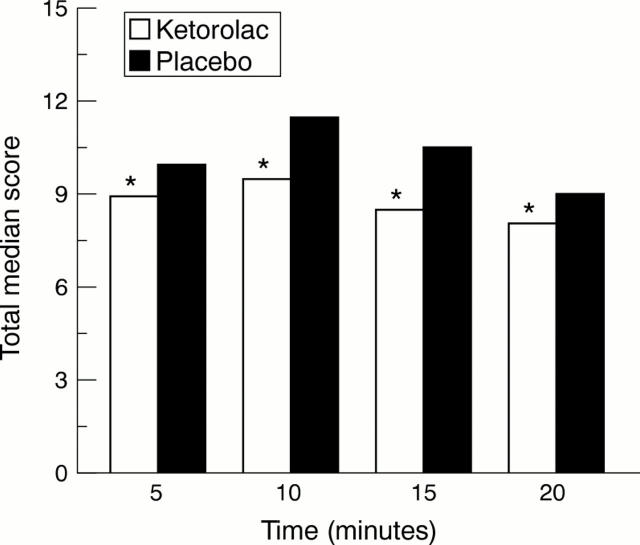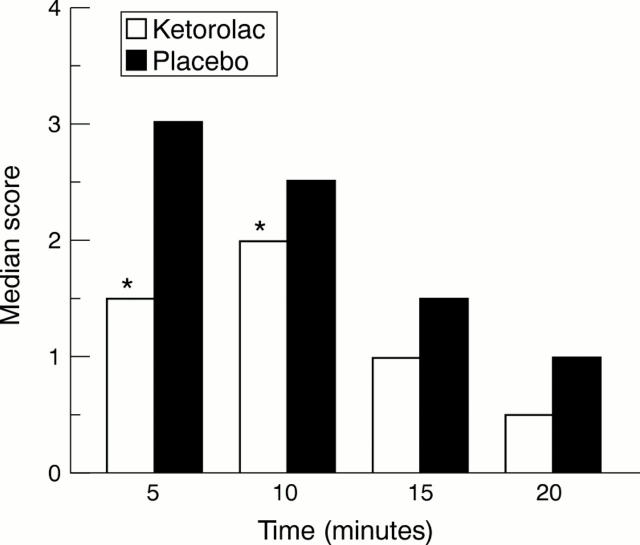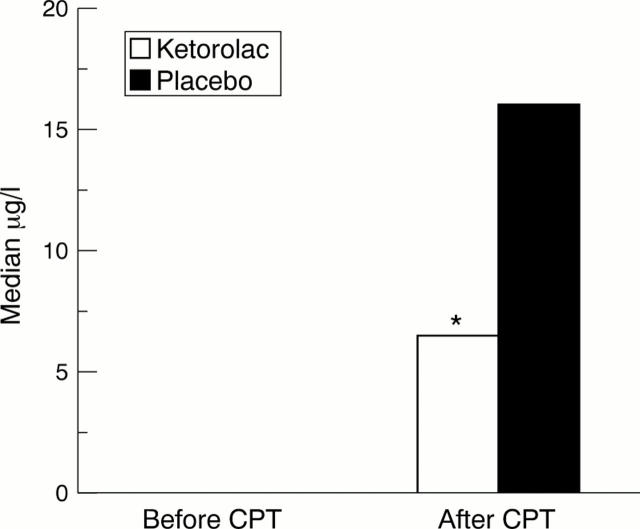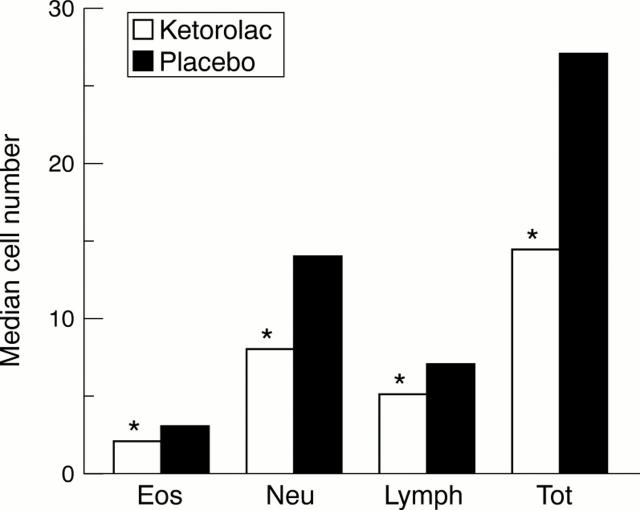Abstract
AIM—To study the effect of the topical anti-inflammatory drug, ketorolac, on (1) the clinical allergic reaction induced by the conjunctival provocation test (CPT); (2) the release of tryptase in tears; and (3) the expression of adhesion molecules on the conjunctival epithelium. METHODS—10 allergic but non-active patients were challenged in both eyes with increasing doses of specific allergen to obtain a positive bilateral reaction and rechallenged, after 1 week, to confirm the allergic threshold dose response. After 2 weeks, a third CPT was then performed bilaterally 30 minutes after topical application of ketorolac in one eye and placebo in the contralateral eye in a double blind fashion. Clinical symptoms and signs were registered 5, 10, 15, and 20 minutes after challenge. The following objective tests were performed: tear tryptase measurement; tear cytology; and conjunctival impression cytology for immunohistochemical expression of ICAM-1 on epithelial cells. RESULTS—Compared with placebo, ketorolac significantly reduced the total clinical score and the itching score in the 20 minutes after challenge (p<0.0005). Tear levels of tryptase were significantly reduced in the ketorolac pretreated eyes compared with placebo (p<0.03). Eosinophils, neutrophils, and lymphocytes in tear cytology were significantly lower in ketorolac treated eyes compared with placebo. A significant difference in the epithelial expression of ICAM-1 was observed between placebo and ketorolac treated eyes (p<0.05). CONCLUSION—Ketorolac proved to be effective in reducing mast cell degranulation, as indicated by significantly decreased tryptase tear levels, as well as the clinical and cytological allergic reaction.
Full Text
The Full Text of this article is available as a PDF (138.9 KB).
Figure 1 .
Total symptom score at 5, 10, 15, and 20 minutes after CPT and pretreatment with ketorolac tromethamine in one eye and placebo in the contralateral eye (n = 10). Ketorolac pretreatment showed a significant reduction in the time course of the total clinical reaction (*p<0.001 by Wilcoxon test).
Figure 2 .
Time course of the symptom of itching after CPT and pretreatment with ketorolac tromethamine in one eye and placebo in the contralateral eye. Ketorolac pretreatment showed a significant reduction of itching at 5 and 10 minutes (*p<0.05; **p<0.01 by Wilcoxon test).
Figure 3 .
Median tryptase tear levels before and after CPT. Before challenge, levels were undetectable, while after challenge tryptase tear levels were significantly lower in eyes pretreated with ketorolac (*p<0.05 by Wilcoxon test).
Figure 4 .
Tear cytology performed at 30 minutes after CPT. The number of eosinophils (eos), neutrophils (neu), lymphocytes (lymph), and the total number of inflammatory cells (tot) were significantly lower in the eyes pretreated with ketorolac (*p<0.05 by Wilcoxon test).
Figure 5 .
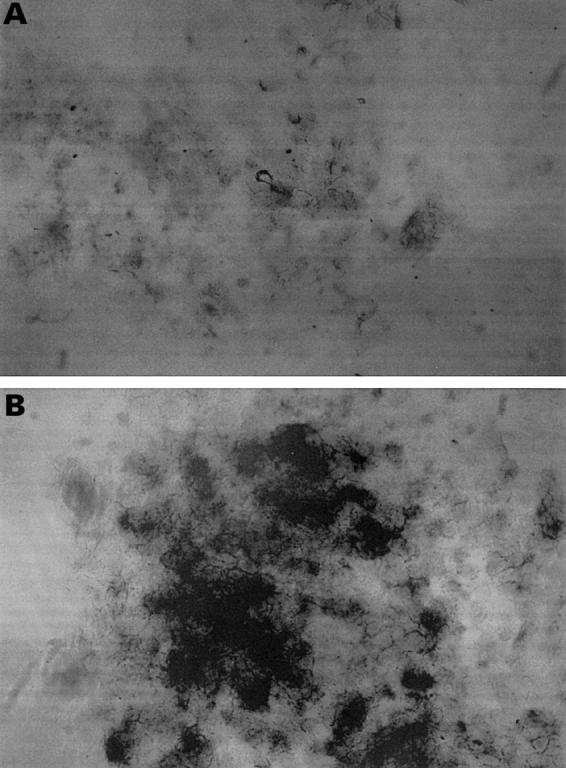
Immunohistochemical expression of ICAM-1 on conjunctival epithelial cells in one eye pretreated with ketorolac (A) and in the contralateral eye pretreated with placebo (B). Note the lesser staining in (A).
Selected References
These references are in PubMed. This may not be the complete list of references from this article.
- Abelson M. B., Chambers W. A., Smith L. M. Conjunctival allergen challenge. A clinical approach to studying allergic conjunctivitis. Arch Ophthalmol. 1990 Jan;108(1):84–88. doi: 10.1001/archopht.1990.01070030090035. [DOI] [PubMed] [Google Scholar]
- Abelson M. B., Leonardi A. A., Smith L. M., Fregona I. A., George M. A., Secchi A. G. Histaminase activity in patients with vernal keratoconjunctivitis. Ophthalmology. 1995 Dec;102(12):1958–1963. doi: 10.1016/s0161-6420(95)30768-3. [DOI] [PubMed] [Google Scholar]
- Abelson M. B., Schaefer K. Conjunctivitis of allergic origin: immunologic mechanisms and current approaches to therapy. Surv Ophthalmol. 1993 Jul-Aug;38 (Suppl):115–132. doi: 10.1016/0039-6257(93)90036-7. [DOI] [PubMed] [Google Scholar]
- Bacon A. S., McGill J. I., Anderson D. F., Baddeley S., Lightman S. L., Holgate S. T. Adhesion molecules and relationship to leukocyte levels in allergic eye disease. Invest Ophthalmol Vis Sci. 1998 Feb;39(2):322–330. [PubMed] [Google Scholar]
- Ballas Z., Blumenthal M., Tinkelman D. G., Kriz R., Rupp G. Clinical evaluation of ketorolac tromethamine 0.5% ophthalmic solution for the treatment of seasonal allergic conjunctivitis. Surv Ophthalmol. 1993 Jul-Aug;38 (Suppl):141–148. doi: 10.1016/0039-6257(93)90038-9. [DOI] [PubMed] [Google Scholar]
- Bonini S., Bonini S., Bucci M. G., Berruto A., Adriani E., Balsano F., Allansmith M. R. Allergen dose response and late symptoms in a human model of ocular allergy. J Allergy Clin Immunol. 1990 Dec;86(6 Pt 1):869–876. doi: 10.1016/s0091-6749(05)80148-4. [DOI] [PubMed] [Google Scholar]
- Bonini S., Bonini S., Vecchione A., Naim D. M., Allansmith M. R., Balsano F. Inflammatory changes in conjunctival scrapings after allergen provocation in humans. J Allergy Clin Immunol. 1988 Sep;82(3 Pt 1):462–469. doi: 10.1016/0091-6749(88)90020-6. [DOI] [PubMed] [Google Scholar]
- Butrus S. I., Ochsner K. I., Abelson M. B., Schwartz L. B. The level of tryptase in human tears. An indicator of activation of conjunctival mast cells. Ophthalmology. 1990 Dec;97(12):1678–1683. doi: 10.1016/s0161-6420(90)32362-x. [DOI] [PubMed] [Google Scholar]
- Canonica G. W., Ciprandi G., Pesce G. P., Buscaglia S., Paolieri F., Bagnasco M. ICAM-1 on epithelial cells in allergic subjects: a hallmark of allergic inflammation. Int Arch Allergy Immunol. 1995 May-Jun;107(1-3):99–102. doi: 10.1159/000236943. [DOI] [PubMed] [Google Scholar]
- Ciprandi G., Buscaglia S., Pesce G., Villaggio B., Bagnasco M., Canonica G. W. Allergic subjects express intercellular adhesion molecule--1 (ICAM-1 or CD54) on epithelial cells of conjunctiva after allergen challenge. J Allergy Clin Immunol. 1993 Mar;91(3):783–792. doi: 10.1016/0091-6749(93)90198-o. [DOI] [PubMed] [Google Scholar]
- Cook E. B., Stahl J. L., Miller S. T., Gern J. E., Sukow K. A., Graziano F. M., Barney N. P. Isolation of human conjunctival mast cells and epithelial cells: tumor necrosis factor-alpha from mast cells affects intercellular adhesion molecule 1 expression on epithelial cells. Invest Ophthalmol Vis Sci. 1998 Feb;39(2):336–343. [PubMed] [Google Scholar]
- Flach A. J., Dolan B. J., Irvine A. R. Effectiveness of ketorolac tromethamine 0.5% ophthalmic solution for chronic aphakic and pseudophakic cystoid macular edema. Am J Ophthalmol. 1987 Apr 15;103(4):479–486. doi: 10.1016/s0002-9394(14)74268-0. [DOI] [PubMed] [Google Scholar]
- Gary R. K., Jr, Woodward D. F., Nieves A. L., Williams L. S., Gleason J. G., Wasserman M. A. Characterization of the conjunctival vasopermeability response to leukotrienes and their involvement in immediate hypersensitivity. Invest Ophthalmol Vis Sci. 1988 Jan;29(1):119–126. [PubMed] [Google Scholar]
- Helleboid L., Khatami M., Wei Z. G., Rockey J. H. Histamine and prostacyclin. Primary and secondary release in allergic conjunctivitis. Invest Ophthalmol Vis Sci. 1991 Jul;32(8):2281–2289. [PubMed] [Google Scholar]
- Leonardi A. A., Smith L. M., Fregona I. A., Salmaso M., Secchi A. G. Tear histamine and histaminase during the early (EPR) and late (LPR) phases of the allergic reaction and the effects of lodoxamide. Eur J Ophthalmol. 1996 Apr-Jun;6(2):106–112. doi: 10.1177/112067219600600202. [DOI] [PubMed] [Google Scholar]
- Leonardi A., Battista M. C., Gismondi M., Fregona I. A., Secchi A. G. Antigen sensitivity evaluated by tear-specific and serum-specific IgE, skin tests, and conjunctival and nasal provocation tests in patients with ocular allergic disease. Eye (Lond) 1993;7(Pt 3):461–464. doi: 10.1038/eye.1993.93. [DOI] [PubMed] [Google Scholar]
- Paolieri F., Battifora M., Riccio A. M., Pesce G., Canonica G. W., Bagnasco M. Intercellular adhesion molecule-1 on cultured human epithelial cell lines: influence of proinflammatory cytokines. Allergy. 1997 May;52(5):521–531. doi: 10.1111/j.1398-9995.1997.tb02595.x. [DOI] [PubMed] [Google Scholar]
- Proud D., Sweet J., Stein P., Settipane R. A., Kagey-Sobotka A., Friedlaender M. H., Lichtenstein L. M. Inflammatory mediator release on conjunctival provocation of allergic subjects with allergen. J Allergy Clin Immunol. 1990 May;85(5):896–905. doi: 10.1016/0091-6749(90)90075-f. [DOI] [PubMed] [Google Scholar]
- Raizman M. B. Results of a survey of patients with ocular allergy treated with topical ketorolac tromethamine. Clin Ther. 1995 Sep-Oct;17(5):882–890. doi: 10.1016/0149-2918(95)80066-2. [DOI] [PubMed] [Google Scholar]
- Rooks W. H., 2nd, Maloney P. J., Shott L. D., Schuler M. E., Sevelius H., Strosberg A. M., Tanenbaum L., Tomolonis A. J., Wallach M. B., Waterbury D. The analgesic and anti-inflammatory profile of ketorolac and its tromethamine salt. Drugs Exp Clin Res. 1985;11(8):479–492. [PubMed] [Google Scholar]
- Trocmé S. D., Gilbert C. M., Allansmith M. R., Bloch K. J., Abelson M. B. Characteristics of the cellular response of the rat conjunctiva to topically applied leukotriene B4. Ophthalmic Res. 1989;21(4):297–302. doi: 10.1159/000266873. [DOI] [PubMed] [Google Scholar]
- Woodward D. F., Nieves A. L., Hawley S. B., Joseph R., Merlino G. F., Spada C. S. The pruritogenic and inflammatory effects of prostanoids in the conjunctiva. J Ocul Pharmacol Ther. 1995 Fall;11(3):339–347. doi: 10.1089/jop.1995.11.339. [DOI] [PubMed] [Google Scholar]



